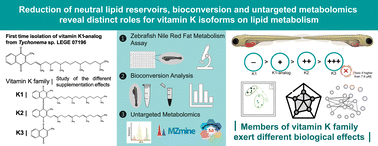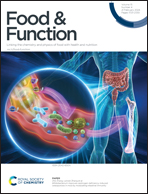Reduction of neutral lipid reservoirs, bioconversion and untargeted metabolomics reveal distinct roles for vitamin K isoforms on lipid metabolism†
Abstract
Vitamin K isoforms are known as co-factors for the synthesis of blood-clotting proteins, but several other bioactivities were reported. In this work, we isolated a vitamin K1-analogue (OH-PhQ) from the cyanobacterium Tychonema sp. LEGE 07196 with lipid reducing activity. OH-PhQ reduced neutral lipid reservoirs with an EC50 value of 31 μM after 48 h exposure in zebrafish larvae, while other vitamin K isoforms had EC50 values of 21.1 μM (K2) and 1.2 μM (K3). No lipid reducing activity was observed for K1 up to 50 μM. The presence of vitamin K isoforms was studied in zebrafish after exposure (OH-PhQ, K1, K2 and K3), and a clear preference for bioconversion was observed to retain K1 and OH-PhQ. Untargeted metabolomics revealed different biological effects for vitamin K isoforms on the subclass and metabolite level, but similarities were present on the compound class level, particularly on the regulation of glycerophospholipids. Our data showed for the first time a lipid reducing activity of OH-PhQ and performed a comparative analysis of vitamin K isoforms, which could be important for the development of future nutraceuticals or food supplements.



 Please wait while we load your content...
Please wait while we load your content...